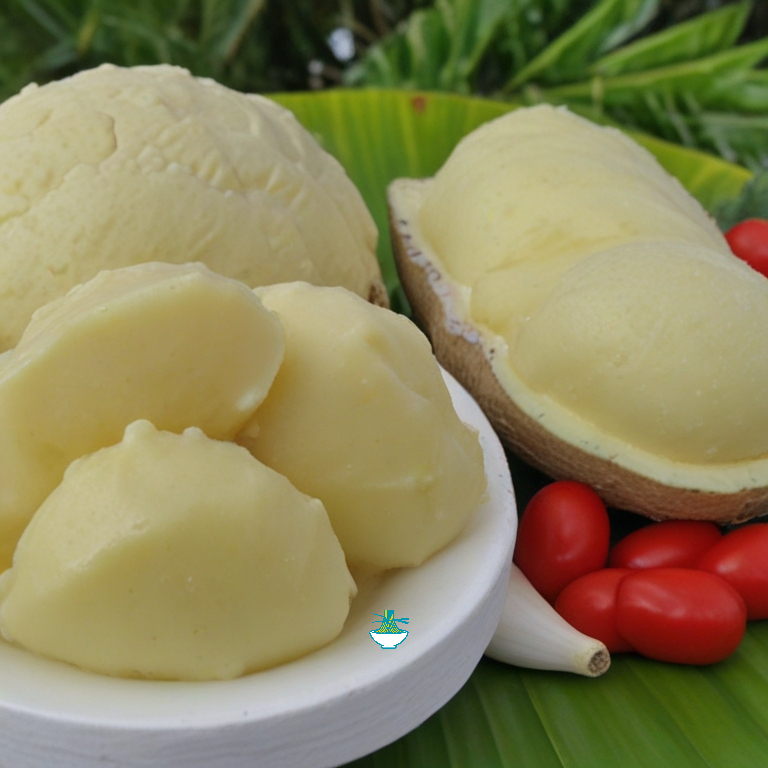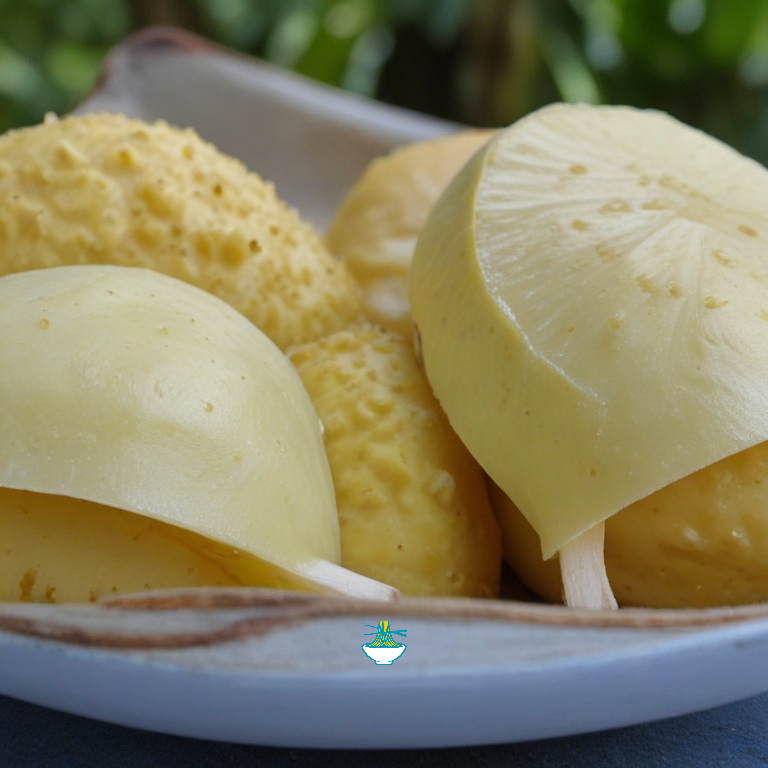Embark on a culinary journey to the Federated States of Micronesia, where cultural heritage meets gastronomic delight with Poi, a beloved fermented breadfruit dish. Poi, a time-honored delicacy, is more than just food; it's a symbol of community, tradition, and the rich history of the Micronesian people.
Crafted from locally sourced breadfruit, Poi undergoes a meticulous fermentation process, resulting in a unique blend of flavors and textures that captivate the senses. With its tangy undertones and velvety consistency, each spoonful of Poi offers a taste of Micronesian heritage.
Whether enjoyed as a standalone dish or paired with other local delicacies, Poi embodies the essence of Micronesian culinary artistry. Passed down through generations, this cherished recipe reflects the resilience and resourcefulness of the islanders, as well as their profound connection to the land and sea.
Indulge in the cultural richness of the Federated States of Micronesia as you savor the authentic flavors of Poi, a culinary treasure that transcends mere sustenance to become a celebration of community and tradition.
Ingredients:
- 1 large breadfruit
- Water
- Clean cloth or cheesecloth
- Large bowl or container

Instructions:
1- Select a ripe breadfruit. Look for one that is firm and free from bruises or blemishes.
2- Wash the breadfruit thoroughly under running water to remove any dirt or debris.
3- Peel the breadfruit and remove the core. Cut it into small chunks or cubes.
4- Place the breadfruit chunks into a large bowl or container.
5- Add enough water to cover the breadfruit completely.
6- Cover the bowl or container with a clean cloth or cheesecloth, securing it with a rubber band or string.
7- Leave the breadfruit to ferment at room temperature for about 3 to 5 days. During this time, the natural yeast present on the breadfruit will initiate the fermentation process.
8- Check the breadfruit periodically to ensure that it is fermenting properly. You may notice bubbles forming, which is a sign that fermentation is occurring.
9- After 3 to 5 days, the breadfruit should be soft and slightly sour-smelling. It should have a texture similar to mashed potatoes.
10- Once fermented, drain any excess liquid from the breadfruit.
11- Mash the fermented breadfruit using a fork or potato masher until it reaches a smooth consistency. Some people prefer a chunkier texture, so you can adjust the level of mashing according to your preference.
12- Your Poi is now ready to be served! Enjoy it as a side dish or accompaniment to your favorite Micronesian dishes.
Note: Poi can be stored in the refrigerator for several days. Just make sure to keep it in an airtight container to maintain its freshness. Additionally, feel free to customize the recipe by adding flavors such as coconut milk or sugar, according to your taste preferences.
Nutritional Values:
here's an approximation of the nutritional values for the main ingredient, breadfruit, commonly used in making Poi:
Nutritional values per 100g of breadfruit:
- Calories: 103 kcal
- Carbohydrates: 27.1 gDietary Fiber: 4.9 g
- Sugars: 11.3 g
- Protein: 1.1 g
- Fat: 0.2 g
- Saturated Fat: 0.1 g
- Monounsaturated Fat: 0.1 g
- Polyunsaturated Fat: 0.1 g
Vitamins:
- Vitamin A: 17 IU
- Vitamin C: 29 mg
- Vitamin E: 0.1 mg
- Vitamin K: 0.7 mcg
- Thiamine (B1): 0.1 mg
- Riboflavin (B2): 0.05 mg
- Niacin (B3): 1.1 mg
- Vitamin B6: 0.1 mg
- Folate (B9): 23 mcg
- Choline: 11.3 mg
- Betaine: 0.1 mg
Minerals:
- Calcium: 17 mg
- Iron: 0.5 mg
- Magnesium: 25 mg
- Phosphorus: 30 mg
- Potassium: 490 mg
- Sodium: 2 mg
- Zinc: 0.1 mg
- Copper: 0.1 mg
- Manganese: 0.1 mg
- Selenium: 0.6 mcg
Breadfruit:
- Carbohydrates: Provide energy for the body's functions.
- Dietary Fiber: Supports digestive health and helps regulate blood sugar levels.
- Vitamin C: Boosts the immune system and promotes skin health.
- Potassium: Helps regulate blood pressure and muscle function.
- Vitamin B6: Supports brain health and helps in the formation of red blood cells.
- Magnesium: Important for muscle function, nerve function, and bone health.
- Folate (B9): Essential for cell division and the production of DNA.
- Vitamin A: Important for vision, immune function, and skin health.
- Iron: Necessary for the production of hemoglobin, which carries oxygen in the blood.
- Phosphorus: Required for bone and teeth formation, as well as energy metabolism.
- Thiamine (B1): Essential for converting food into energy and maintaining nerve function.
- Riboflavin (B2): Helps convert food into energy and acts as an antioxidant.
- Niacin (B3): Supports energy metabolism and healthy skin.
- Vitamin E: Acts as an antioxidant and helps protect cells from damage.
- Vitamin K: Essential for blood clotting and bone health.
- Selenium: Acts as an antioxidant and supports thyroid function.
- Zinc: Important for immune function, wound healing, and DNA synthesis.
- Copper: Necessary for the formation of red blood cells and the function of the immune system.
- Manganese: Supports bone health, metabolism, and antioxidant function.
- Sodium: Important for fluid balance, nerve function, and muscle contraction.
- Choline: Important for brain health, liver function, and metabolism.
- Betaine: Supports liver function and helps reduce inflammation.
Please note that these values are approximate and can vary depending on factors such as the variety of breadfruit, ripeness, and cooking methods. Additionally, if you plan to add any other ingredients such as sugar or coconut milk to your Poi, you may need to consider their nutritional values as well.


Comments